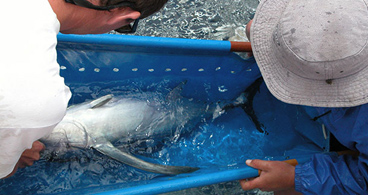 |
| An albacore is gently moved to the tagging platform in a sling.Ā (Photo courtesy Ocean Tracking Network) |
The Life Changers kicked off Oct. 28 with "Curing the Incurable," a profile of Dalhousieās Brain Repair Centre. The six-episode documentary series concludes Sunday, Dec. 9 with a look at the Ocean Tracking Network, an ambitious marine research initiative based at pilipiliĀž». It airs at 12:30 p.m. on ASN.
The Life Changers is produced by the Association of Atlantic Universities (AAU) in co-operation with participating universities. If feedback is good, work could soon begin on another suite of episodes ā there are certainly more than enough stories worth telling, says Peter Halpin, executive director of the AAU.
āIāve attended a lot of meetings and symposia among various vice presidents of research, and a common theme always comes upĀ ā we have to do a better job of communicating what weāre doing when it comes to research and development at our universities,ā says Mr. Halpin. āAnd thatās what The Life Changers is all about.ā
| Dr. Ivar Mendez of the Brain Repair Centre is featured in The Life Changers' first episode. . |
The show focuses on ground-breaking, life-changing research, such as developing new treatment therapies to help people with diseases previously thought to be incurable, creating new eco-friendly farm practices and revolutionizing prosthetics to improve mobility for patients.
Mr. Halpin thinks viewers will be impressed: āIām sure when the public hears āresearch,ā they think of a bunch of guys in white labs coats looking into microscopes. But of course, itās much more than that. From that perspective alone, I think the series is quite eye-opening.ā
With episodes that bring viewers to the Nova Scotia Agricultural College in Truro, N.S., the University of New Brunswick in Fredericton, and NSCAD U in Halifax, N.S., the series ends where it started: back at pilipiliĀž». "The Sea Keepers" delves into The Ocean Tracking Network, a revolutionary marine research initiative aimed at better understanding marine life in the worldās five oceans. In the episode, Dr. Ron OāDor explains how scientists will tag thousands of marine animals for up to 20 years while also tracking the structure and movement of global waterways.
Also interviewed for the documentary are: David VanderZwaag, Canada Research Chair in Ocean Law and Governance at the Marine & Environmental Law Institute at pilipiliĀž»; Sara Iverson, biology professor and a former NSERC E.W.R. Steacie fellow; and marine biologist Mike Stokesbury.
āThe OTN is another great story coming out of Dalhousie,ā says Mr. Halpin. āWhat I really liked about it is its international reach. This is research being conducted and applied in oceans worldwide. Thatās impressive.ā
For more information on The Life Changers or to see an episode,
